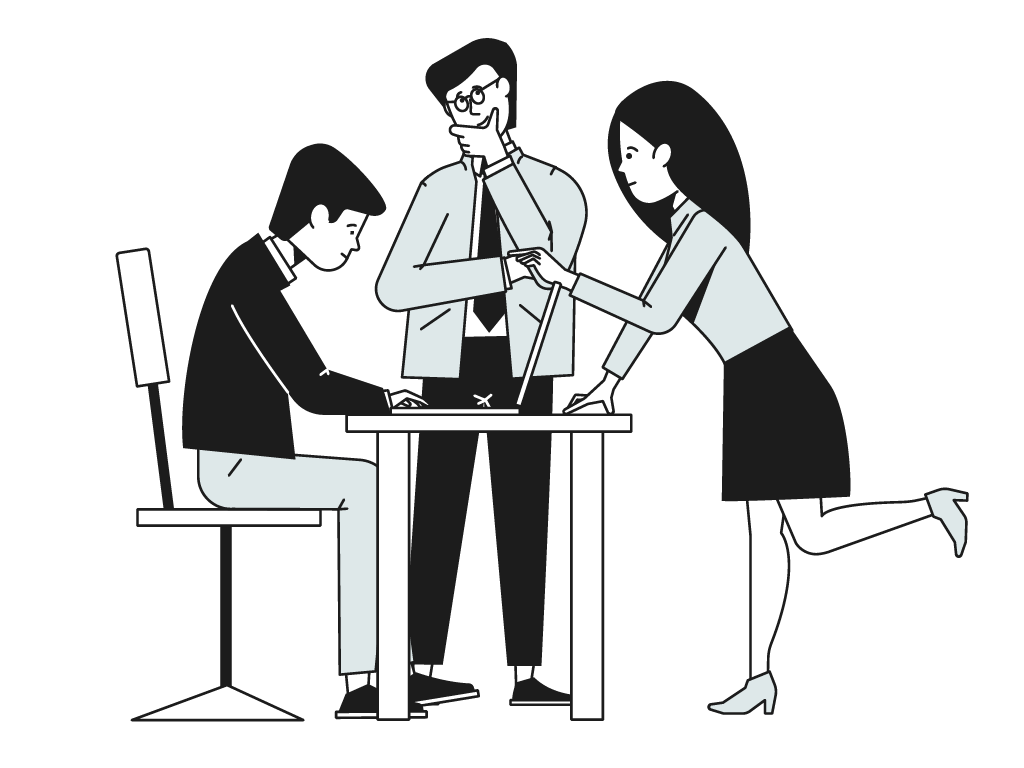Career plan
Changing your career plans at 30, 40 or 50: each age has its advantages and constraints. Even if you have a good reason for changing job or profession, that doesn't mean it's not scary. It can be daunting at any age. But it should never be too late to make a career change that will make you feel more fulfilled.
Professional retraining
The challenges of developing your career plan
The 3 main reasons for change in my practice:
- You are looking to develop professionally because you feel that you have made as much progress as possible in your current job.
- You're feeling burnt out by a corporate culture that doesn't suit you, constant reorganisation or the insecurity of your job.
- You find yourself involuntarily changing career due to expatriation, redundancy or a redundancy package.
Anyone who changes career faces certain risks, whatever their age. You're thinking of leaving behind :
- a professional network
- social relations
- your reputation
- your expertise and technical skills
The 3 main attitudes to the prospect of changing your career plan :
- You're weighing up the pros and cons of change, wondering how you're going to provide for your family.
- You feel guilty about having wasted time on a career you don't enjoy
- You oscillate: some mornings you imagine lots of possibilities, and other mornings you have no idea.
But the real question is: what have you got to lose in your life if you don't change? NOT your professional situation?
Find out more about the challenges of developing your career plan
Our approach to supporting change
your career plan
The 3 profiles of people I support
If you are looking to develop your career (e.g. change profession, sector of activity, status) and already have an idea...
I can help you finalise and realise your career plan, remove obstacles and activate your resources.
Focus on coaching
What you want to reproduce or avoid from past experiences, prioritising your career choices, listing the support points and networks you need to make your project a reality, drawing up an action plan, etc.
Duration and frequency
In general, 4 to 6 sessions of 60 to 90 minutes over 3 to 4 months.
Location
Face-to-face in premises that protect the confidentiality of exchanges (Paris 15th) and/or remotely via Zoom.
If you don't really know what type of job or sector might appeal to you, or where to start...
I can help you define a new career plan that suits you and the French job market.
Focus on coaching
The ideal and acceptable compromises for this new project, updating skills and desires in relation to the job market, the steps to be taken to be able to make a living from this new project, etc.
Duration and frequency
In general, 8 to 12 sessions of 60 to 90 minutes over 6 to 8 months.
Location
Face-to-face in premises that protect the confidentiality of exchanges (Paris 15th arrondissement) and/or remotely via Zoom.
The benefits of my one-to-one support in developing your career plan
- Put your energy where it's needed understanding how the job market and recruitment practices work in France
- Convince recruiters and future employers more quickly by better presenting the specific features of your career (in France or abroad) and your skills during interviews
- We start by getting to know each other to see if we'd like to work together, during an initial one-hour discussion. If we choose each other, we're in! If we decide not to work together, I won't be billing this first meeting.
- I offer tailor-made coaching I define the number of sessions, duration, frequency and location (face-to-face or remote), depending on the context and needs of each individual. I can also suggest (or not) exercises to do between sessions.
- I am working in French or English.

Let's work together!
Support schemes linked to this theme

?
Questions I'm often asked about the development of a career plan
What kind of career development can coaching with me lead to?
My clients come from a variety of backgrounds, for example :
- A completely different job that they'd always thought about but never imagined they'd get one day, given their level of responsibility.
- A completely different job that they had never imagined doing or even suspected existed.
- A position in the same organisation or in other organisations in their current field of expertise
- A self-employed or entrepreneurial activity
- A portfolio of activities combining two or more things they like to do (slasheur)
How can you manage your career development?
Finding the right support to help you with your career plans can often be a difficult task. Working with a coach can provide the ideal confidential and caring environment to help you unlock your full potential and identify the steps you need to take to make your career plans a success.
I specialise in supporting people who want to make changes in their professional careers, building on their strengths.
How can you combine your professional and personal plans?
What does a skills assessment involve?
A skills assessment is an individual approach that enables people to analyse their skills, aptitudes, motivations and career aspirations. This approach is often offered by skills assessment centres or specialist organisations, and can be financed by the employer or by training funds.
The skills assessment is a standardised process comprising several stages, whatever the type of post:
- The preliminary phase: This phase is used to determine the objectives and procedures for the skills assessment, based on the individual's needs and expectations. It is also used to determine the funding and duration of the process.
- Individual interviews: This phase involves analysing the person's skills, aptitudes, motivations and career aspirations, using a questionnaire and individual interviews with a skills assessment advisor. These interviews focus on taking stock of the individual's career path, past work experience, training taken, etc.
- Tests and exercises: This phase may include psychometric tests, work situations, brainstorming exercises, etc. These tools provide a better understanding of the person' s skills and aptitudes, and help to determine their areas for development according to their field of activity or the type of company envisaged.
- The conclusion: This phase provides an assessment of the person's skills, highlighting their strengths, weaknesses and areas for development, and possibly a few possible career paths. If necessary, it can lead to a draft action plan, based on the results of the skills assessment.
A skills assessment can be useful for a number of reasons, including rethinking your career path, or simply gaining a better understanding of your skills and professional aptitudes.
At what age should you start challenging your career plans?
There is no specific age for challenging your career plan. You can regularly review your professional objectives throughout your career, particularly when there are significant changes in your personal or professional life.
Certain key stages in life may call for a more in-depth examination of career choices, such as the end of studies, the birth of a child, a move, redundancy or approaching retirement. In these cases, it may be wise to take time to reflect on your career aspirations and needs.
What's more, technological, economic and social changes can also affect job opportunities and labour market requirements, so it's important to keep abreast of developments in business sectors and skills.
Can Pôle Emploi help with a career plan?
Yes, Pôle Emploi can help you rethink your career path - offering a range of services and tools to help jobseekers develop the skills they need, make career changes and find a job that better matches their career aspirations.
Here are some of the possible forms of assistance offered by Pôle Emploi:
- Workshops and training: Pôle Emploi offers workshops and vocational training to help jobseekers develop their skills, improve in their chosen field and prepare a covering letter or job interview.
- Individual interviews: these can help to better target job and training opportunities that match candidates' needs and skills.
- Job vacancies: Pôle Emploi can also offer job vacancies in sectors that are in demand, to encourage jobseekers to explore new career opportunities.
- Financial assistance: Pôle Emploi can also offer financial assistance to help jobseekers take further training in line with their professional activity, including business start-ups.
